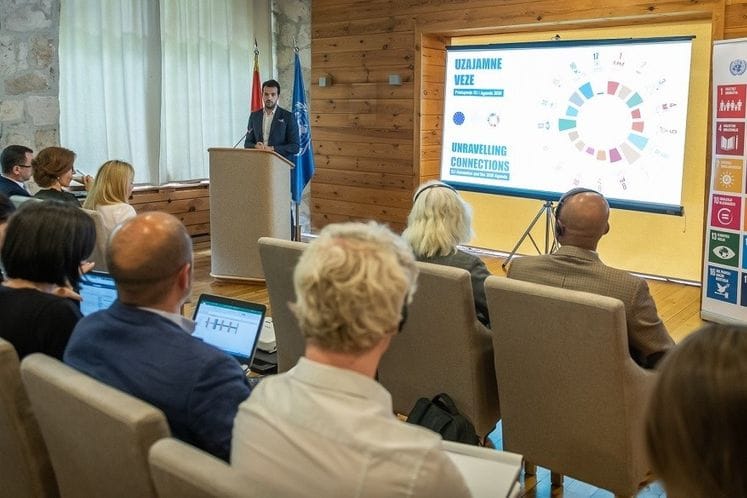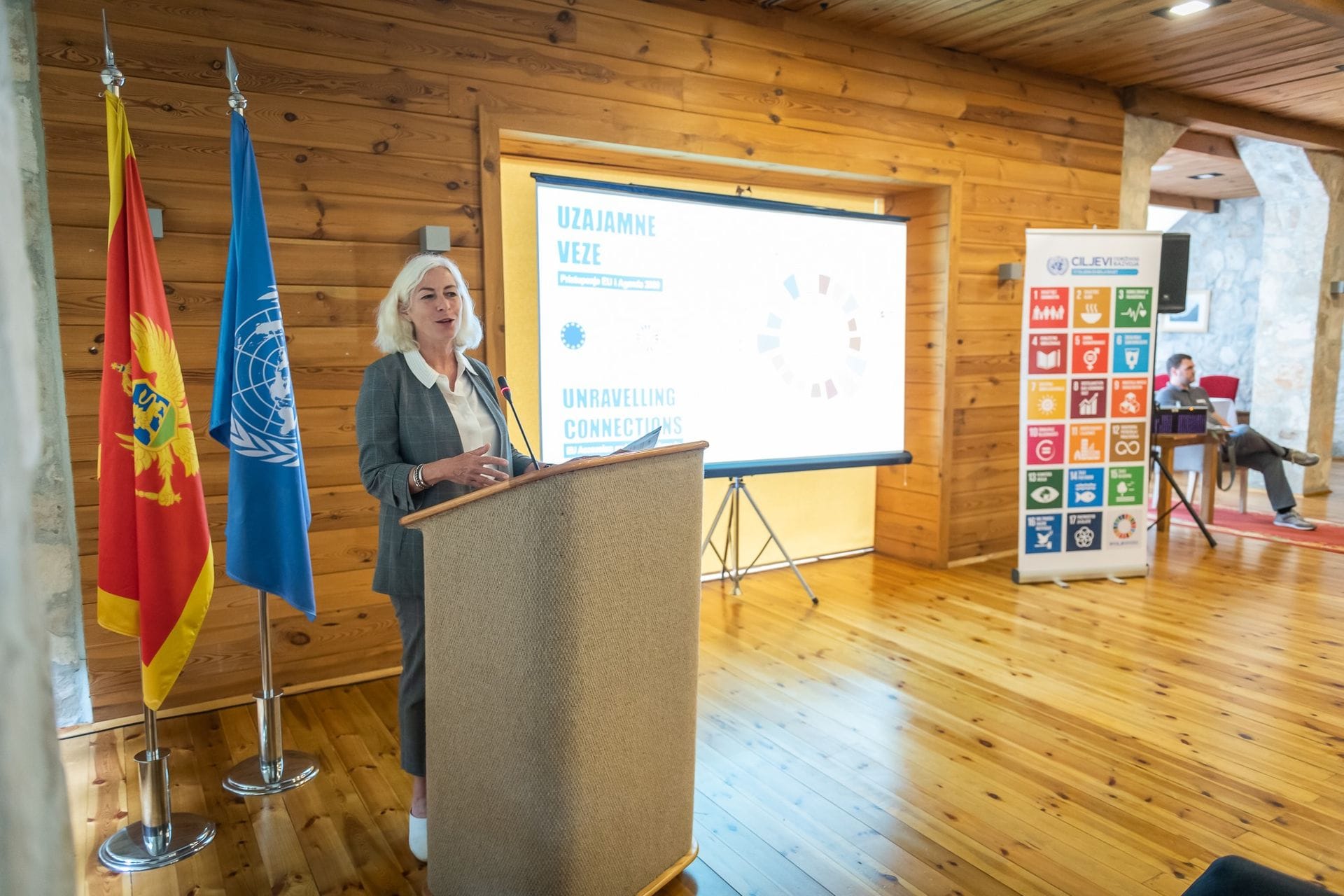- Government of Montenegro
Ministry of European Affairs Boosting synergies between the EU Accession and 20...
Please note: The page below represents the archived content relating to the previous Government of Montenegro. Some of the information might be inaccurate or outdated.
Archive
Boosting synergies between the EU Accession and 2030 Agenda

Published on: Jun 25, 2019 • 3:01 PM Author: KEI
The continuation of boosting synergies between the two major development processes in Montenegro - accession to the European Union and implementation of the 2030 Agenda for Sustainable Development was the central topic of the two-day meeting organized by the Office of the Chief Negotiator of the Government of Montenegro and the United Nations System in the country.
"By linking the EU negotiations process with the implementation of the Agenda for Sustainable Development by 2030, Montenegro has focused not only on national priorities but also on the sustainable development needs recognized by the citizens all over the world" - said Marko Mrdak, Deputy Chief Negotiator.
"Linking these processes is a logical sequence of steps if have in mind that two thirds of the 17 goals, more precisely 109 of the 169 targets of the 2030 Agenda, are linked to negotiation chapters," Mrdak added, stressing out that the Government of Montenegro use all available international expertise in order to contribute to a better standard of living for all citizens. Mrdak reminded that the Government has synchronised the EU negotiation process with 2030 Agenda within its strategic framework, and thus created a context for coherent management of all policies that lead to the achievement of internal and external strategic goals.
The two-day workshop gathered representatives of the Montenegrin negotiating structure - negotiators, secretaries and members of working groups for negotiation chapters, as well as representatives of the United Nations System in Montenegro. The workshop is continuation of joint efforts to link two agendas, following efforts in 2018 when a high level of complementarities was identified between two agendas, but also a space for further strengthening of synergies, as described in the report: Unravelling Connections: EU Accession and Agenda 2030.
During the two-day event, the participants worked on identification of concrete program areas and common goals of two agendas, and on matching dynamics as well as on mapping relevant instruments that will strengthen the achievement of the goals of both processes.

"The EU accession and the 2030 Agenda for Sustainable Development are two international commitments transformed into national priorities by the Government of Montenegro. The fulfilment of the accession criteria and the achievement of the Sustainable Development Goals will unleash series of transformative changes to the country, and as such, the supreme goal of improved lives of people in Montenegro will be achieved," said Fiona McCluney, UN Resident Coordinator in Montenegro. She emphasized the importance of using combined knowledge and resources in solving key national priorities.
"This workshop is a proof of that, and it comes at a fortunate moment to advance our actions on the identified synergies and complementarities between EU accession and Agenda 2030," McCluney added.
The event was organized within the framework of the global process of integrating the Sustainable Development Goals into national policies entitled Mainstreaming, Acceleration and Policy Support (MAPS), with the support of the UNDP Regional Center in Istanbul.
Accession to the European Union is a key development priority of Montenegro. At the same time, Montenegro, as one of the 193 UN member countries, adopted the 2030 Sustainable Development Agenda based on 17 Sustainable Development Goals.
"By linking the EU negotiations process with the implementation of the Agenda for Sustainable Development by 2030, Montenegro has focused not only on national priorities but also on the sustainable development needs recognized by the citizens all over the world" - said Marko Mrdak, Deputy Chief Negotiator.
"Linking these processes is a logical sequence of steps if have in mind that two thirds of the 17 goals, more precisely 109 of the 169 targets of the 2030 Agenda, are linked to negotiation chapters," Mrdak added, stressing out that the Government of Montenegro use all available international expertise in order to contribute to a better standard of living for all citizens. Mrdak reminded that the Government has synchronised the EU negotiation process with 2030 Agenda within its strategic framework, and thus created a context for coherent management of all policies that lead to the achievement of internal and external strategic goals.
The two-day workshop gathered representatives of the Montenegrin negotiating structure - negotiators, secretaries and members of working groups for negotiation chapters, as well as representatives of the United Nations System in Montenegro. The workshop is continuation of joint efforts to link two agendas, following efforts in 2018 when a high level of complementarities was identified between two agendas, but also a space for further strengthening of synergies, as described in the report: Unravelling Connections: EU Accession and Agenda 2030.
During the two-day event, the participants worked on identification of concrete program areas and common goals of two agendas, and on matching dynamics as well as on mapping relevant instruments that will strengthen the achievement of the goals of both processes.

"The EU accession and the 2030 Agenda for Sustainable Development are two international commitments transformed into national priorities by the Government of Montenegro. The fulfilment of the accession criteria and the achievement of the Sustainable Development Goals will unleash series of transformative changes to the country, and as such, the supreme goal of improved lives of people in Montenegro will be achieved," said Fiona McCluney, UN Resident Coordinator in Montenegro. She emphasized the importance of using combined knowledge and resources in solving key national priorities.
"This workshop is a proof of that, and it comes at a fortunate moment to advance our actions on the identified synergies and complementarities between EU accession and Agenda 2030," McCluney added.
The event was organized within the framework of the global process of integrating the Sustainable Development Goals into national policies entitled Mainstreaming, Acceleration and Policy Support (MAPS), with the support of the UNDP Regional Center in Istanbul.
Accession to the European Union is a key development priority of Montenegro. At the same time, Montenegro, as one of the 193 UN member countries, adopted the 2030 Sustainable Development Agenda based on 17 Sustainable Development Goals.
Related articles:
Twenty-sixth Newsletter on European integration Dec 29, 2023
Is this page useful?
